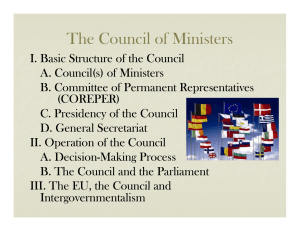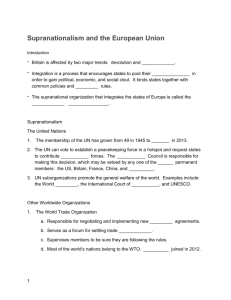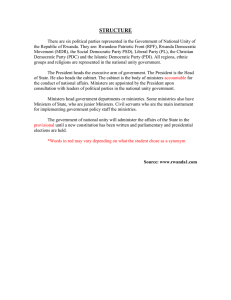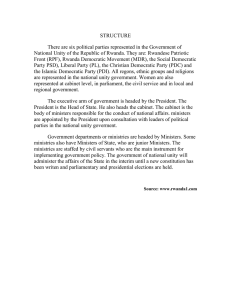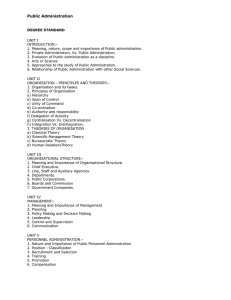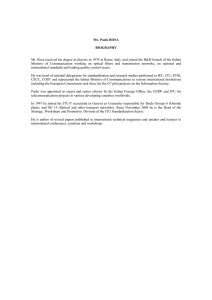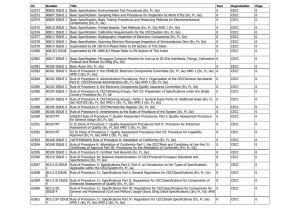Convention Establishing the Central American Educational and
advertisement
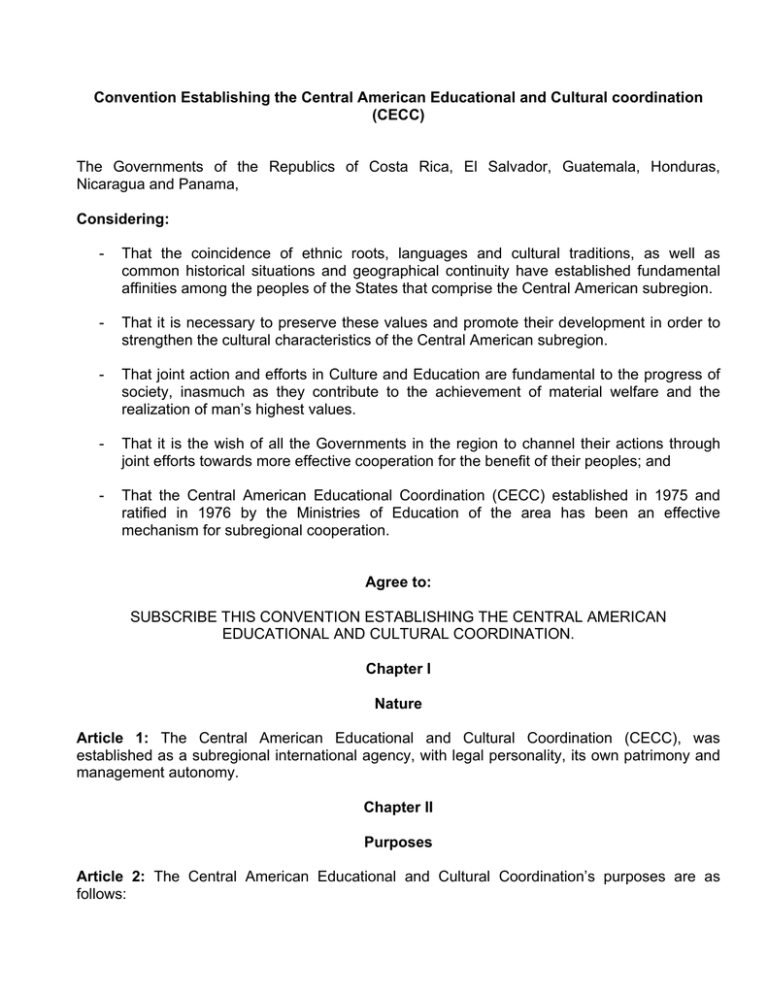
Convention Establishing the Central American Educational and Cultural coordination (CECC) The Governments of the Republics of Costa Rica, El Salvador, Guatemala, Honduras, Nicaragua and Panama, Considering: - That the coincidence of ethnic roots, languages and cultural traditions, as well as common historical situations and geographical continuity have established fundamental affinities among the peoples of the States that comprise the Central American subregion. - That it is necessary to preserve these values and promote their development in order to strengthen the cultural characteristics of the Central American subregion. - That joint action and efforts in Culture and Education are fundamental to the progress of society, inasmuch as they contribute to the achievement of material welfare and the realization of man’s highest values. - That it is the wish of all the Governments in the region to channel their actions through joint efforts towards more effective cooperation for the benefit of their peoples; and - That the Central American Educational Coordination (CECC) established in 1975 and ratified in 1976 by the Ministries of Education of the area has been an effective mechanism for subregional cooperation. Agree to: SUBSCRIBE THIS CONVENTION ESTABLISHING THE CENTRAL AMERICAN EDUCATIONAL AND CULTURAL COORDINATION. Chapter I Nature Article 1: The Central American Educational and Cultural Coordination (CECC), was established as a subregional international agency, with legal personality, its own patrimony and management autonomy. Chapter II Purposes Article 2: The Central American Educational and Cultural Coordination’s purposes are as follows: a. To develop and deepen relations among the peoples of Central America, through continued cooperation and mutual assistance in the fields of Education and Culture, in order to promote the integrated development of member countries. b. To stimulate the integrated development of man, including the cultural component, within all educational processes. c. To reaffirm the identity of member countries and of the subregion. Chapter III Modalities of Action Article 3: In order to achieve its aims, the Central American Educational and Cultural Coordination shall adopt the following modalities of action: a. Promote cooperation among Ministries, universities, academies and other educational and cultural institutions or entities in the area, mainly through the free exchange of knowledge, ideas and experiences in order to find solutions to problems that are of common interest. b. Encourage the development of multilateral programmes and national research, experimentation, innovation and technological cooperation, both in public and private institutions c. Coordinate activities of official educational and cultural institutions addressing similar problems in member countries to obtain solutions of common interest. d. Organize regular meetings of experts or officials responsible for various services, for the study of special topics or the exchange of experiences in the fields provided by this Convention e. Contribute to preserving the Cultural Heritage of Member Countries by supporting those legal measures that are adopted to avoid its loss or damage. f. To support the actions taken by Member States for the rescue of cultural goods illegally removed. g. To facilitate the exchange between individuals and educational and cultural groups. h. Grant, reciprocally, scholarships to nationals of countries that are part of the Convention, both for research and for teaching, as well as for scientific, technical and artistic training in specialized establishments in each country. i. Stimulate bibliographic and information exchange services through the Libraries, National Archives and Documentation Centres of the signatory countries. Create in the National Libraries and educational establishments of the signatory countries bibliographic sections containing the publications of each of them. j. Establish common means of publishing literary, artistic and scientific works in each country, whose value and content are of interest in other member countries. k. Promote the dissemination of manuals, texts, journals and newspapers in each of the member countries to serve the objectives of the CECC. l. Promote the creation of a socio-educational information centre at the Central American level, centralizing the information provided by the Ministries of Education and responsible institutions of the Cultural Sector. m. Support the reciprocal protection of copyrights of literary educational, scientific and artistic works. n. Promote the development of inventories of Cultural Property in each country with a view to creating a Subregional Cultural Heritage catalogue. o. Encourage the media of each country to extend their coverage of the history, geography, literature, economics, arts and folklore of other Subregion countries and promote cultural tourism with the purpose of showcasing and highlighting the value of their cultural heritage. p. Participate in the study and implementation of, and deliver an opinion, through their responsible entities, on subregional educational and cultural projects in which participate international technical and financial cooperation organizations, according the CECC, as deemed relevant, the role of subregional governmental counterpart. Chapter IV Of the Organs of the CECC Article 4: The Central American educational and cultural Coordination (CECC) is composed of the following bodies: a. The Meeting of Ministers of Education and Ministers of Culture. b. The Technical Committees. c. The General Secretariat. d. The National Commissions. Of the Meeting of Ministers Article 5: The Meeting of Ministers is a deliberative and decision-making organ, which is responsible for approving policies, strategies, the plan of activities and budget for the CECC. It is made up of the Ministers of Education and the Ministers of Culture of Member States. It is chaired by the Minister of Education of the host country of the meeting until the start of the next Ordinary Meeting. Member States not possessing a Ministry of Culture shall be represented by the highest-ranking officials of the respective sector. Article 6: The Ordinary Meeting of Ministers will take place annually, in which may participate, in addition, observers and special guests at the proposal of the chairman and the other members. Of the Technical Committees Article 7: The Technical Commissions are advisory, examining and consultation bodies of the CECC and are composed of technical staff, two tenured and two substitute members for each Member State, appointed by the respective Ministers. Article 8: There will be a technical commission for each of the sectors covered by this Convention and the coordinators of these commissions will attend the Meeting of Ministers to inform and advise, in coordination with the General Secretariat. Of the General Secretariat Article 9: The General Secretariat is the executive and administrative organ of the CECC. It is made up of the Secretary-General, who directs it, and the necessary administrative and technical staff. Article 10: The General Secretariat will have its permanent headquarters in one of the area countries, according to decision by the Meeting of Ministers. Of the National Commissions Article 11: In each member country there shall be formed a National Commission of the CECC, which shall be comprised of members of the National Technical Committees and other officials that the respective government deems appropriate. They shall serve as liaison bodies coordinating and disseminating the objectives and activities of the CECC at the national level. Chapter V Of Funding Article 12: The Central American Educational and Cultural Coordination shall have the following sources of funding: a. That which is set by the Meeting of Ministers as the annual budget quota for Member Countries. b. Interest generated by the Common Fund referred to in Article 13 of the Convention. c. Contributions from international technical and financial cooperation institutions. d. Revenues derived as a result of its administrative management, provided they do not contravene its purposes. e. Donations from foundations and entities interested in the cultural and educational development of Central America. Article 13: Member States agree to form a Common Fund to finance the activities of the CECC. To this end, Member States shall indicate in their respective budgets the amounts and times for payment of the respective contributions. The funds will be deposited in trust with a financial institution, preferably, a Central American one. Article 14: The General Secretariat shall submit annually to the Meeting of Ministers, the financial statements and the proposed budget for the coming year based on the plans and programmes of activities submitted by the Technical Committees. Chapter Vl General Provisions Article 15: The Ministries of Education and Culture of the Member Countries shall negotiate with the relevant governments fiscal and migratory advantages as needed to carry out the purposes of the CECC. Article 16: This Convention shall enter into force when at least three countries have notified the Government of the country where this Convention has been signed, that they have officially ratified it; and for the others, on the date of deposit of the instrument of ratification. Article 17: This Convention shall be of indefinite duration and may be denounced. In such case, denunciation shall take effect six months after its official presentation to the other member countries. Article 18: The member state designated as Host of the General Secretariat shall sign the Hosting Agreement and will provide the physical facilities, materials and local and support staff support for its operation. Article 19: The present Convention shall be open to accession by other countries of the subregion, after unanimous approval of the Member States. Article 20: Upon entry into force of this Convention, a certified copy will be sent to the General Secretariat of the United Nations, for the purposes of registration pointed out in Article 102 of the Charter of that Organization. Managua, Nicaragua, November 13, 1982. For the Government of Costa Rica Eugenio Rodríguez Vega Ministry of Education For the Government of Guatemala Miguel Angel Barrios Representative of the Ministry Education For the Government of El Salvador Carlos Aquilino Duarte Ministry of Education For the Government of Panama Susana R. de Torrijos Ministry of Education For the Government of Honduras Marco Tulio Mejía Vice Ministry of Education For the Government of Nicaragua Carlos Tunnermann Bernheim Ministry of Education of
